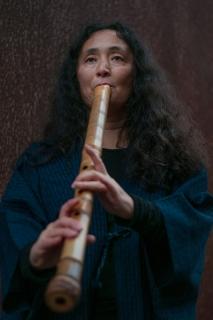
A dynamic presentation from two masters of jinashi (natural) and bass size Zen bamboo flutes, each with their own deep training and experience in traditional repertoire, modern music and spiritual cultivation facets of this rare instrument originating in Japanese Buddhism. Ranging from virtuosic and energetic to meditative and subtle, this 100% breath-powered concert will feature robust solo, duo and group performances on a range of flute sizes.
Shakuhachi—the root-end bamboo, vertical flute of Zen Buddhism—is like a talisman from feudal Japan. Legends of spies, monks and samurai abound in its colorful origins, yet its basic 5-hole, no-mouthpiece design strongly echoes an even more distant time of prehistoric bone flutes. Oddly, it is this same stripped-down, no-frills design that allows the shakuhachi's dynamic adaptation into modern and forward-leaning music. Jinashi (100% bamboo) shakuhachi and low-pitched, wide-bore variants (taimu, hocchiku, kyotaku) add more depth, texture, mystery and nature-connection than the highly lacquered, brighter court music flutes that became more common as "shakuhachi" in the 20th century.
Kiku Day (PhD, London; MFA, Mills; BA, London) is an ethnomusicologist and shakuhachi player, working as an external lecturer at the Royal Academy of Music, Aarhus, Denmark, teaching ethnomusicology. She grew up in Copenhagen, Denmark with her Japanese and American parents. She gave up her studies in classical Western flute to study Zensabō honkyoku repertoire with master Okuda Atsuya in Tokyo for 11 years.
Day has, since her return to Europe, dedicated her life to the potential use of jinashi shakuhachi toda,y and has been occupied with the creation of a contemporary repertoire for jinashi shakuhachi. Several composers from different parts of the world have written for her, including Takahashi Yuji, Roxanna Panufnik, Frank Denyer, Vytautas Germanavicius, Yumi Hara and Mogens Christensen, among others. She has performed with performers such as Fred Frith, Joanna Macgregor, Mats Gustaffson and Joëlle Leandre, and as a soloist with Odense Symphony Orchestra playing Takemitsu Toru’s November steps and Panufnik’s Wild Ways with Nonsuch Choir.
Today, Day continues her research and publishing on regional shakuhachi traditions, the shakuhachi communities online and spirituality in shakuhachi playing. She lives at a meditation centre in Denmark and explores the connection between meditation and shakuhachi playing. Day is a founding member of the European Shakuhachi Society for which she now serves as chairperson and is the chair of the World Shakuhachi Festival 2018 Executive Committee.
Founder/composer of Black Earth Shakuhachi School, Cornelius Boots has forged his own eclectic style as a professional woodwind performer since 1989. A three-time graduate of Jacobs School of Music (BM Classical Clarinet ’97, BS Audio Recording ’97, MM Jazz Studies ’99) and licensed shihan (master) in the dynamic shakuhachi lineage of Watazumido. First Prize winner of the 2013 International Clarinet Composition Competition, Boots has also received commissions and awards from Chamber Music America, Yerba Buena Center for the Arts, Areon Flutes, International Songwriting Competition and Meet the Composer and performed at concerts and festivals in Montreux, Chicago, Assisi, Prague, Tokyo, Karasuyama, and Quebec.
In 2018, he was a finalist in the World Shakuhachi Competition, a featured performer for Sony PlayStation’s E3 press conference (LA) and a featured performer/lecturer at both the World Bamboo Congress (Xalapa, Mexico) and the World Shakuhachi Festival (London). In 2019, Boots started up the Heavy Roots Shakuhachi Ensemble, the world’s first bass shakuhachi group, debuting at SF Music Day. As a series curator at the Center for New Music in San Francisco, Boots will be collaborating with other deep woodwind soloists and innovators in 2020 and 2021.
Boots’ experience as a jazz saxophonist, orchestral clarinetist, funk bandleader and founder/composer of the renowned bass clarinet quartet Edmund Welles have made him a sought after composer and collaborator for bold woodwind soloists, rock and chamber groups as he continues to create new repertoire for his instruments.
“exuberant … a natural anxiety demolisher” (Paste Magazine)
“far left of center–beyond category” (Ari Herstand, author of How to Make It in the New Music Business)
